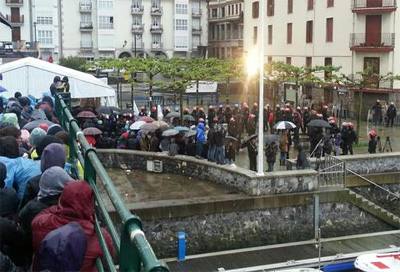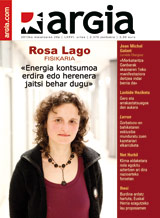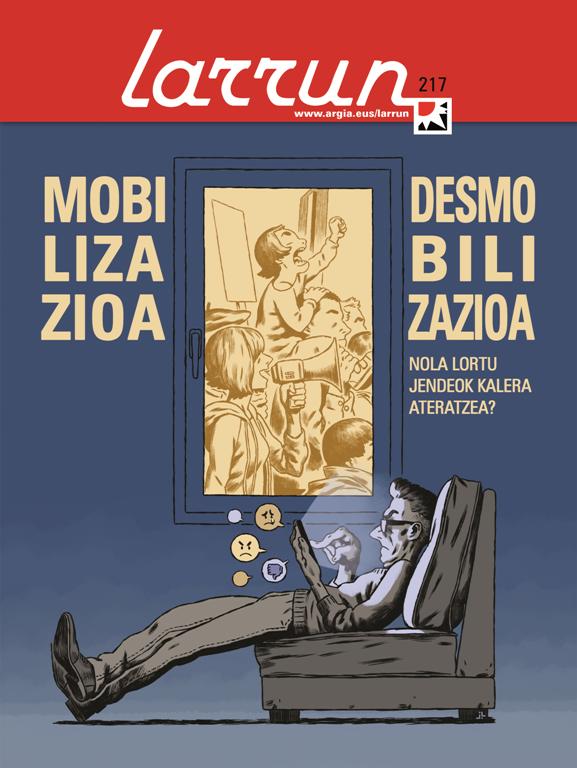Laboratory of the 'popular wall'

Justice, law, legitimacy and political opportunity are mixed in popular walls, all in the context of the peace process and the new situation in Basque society. Donostia-San Sebastián, Ondarroa and the third area will be located in the Region of Pamplona/Iruña.
The four components cited, from where to look at them, always look different. From the point of view of justice, there is no doubt that, in general, in Basque society, the imprisonment of those accused for political activity is only bad (18/98, Batasuna, Segi...).Well in Spain as a whole. In all other cases yes, but the adequacy to the reality of the legal reading in the Basque question is, for now, outside Madrid. The possibility of a peace process is not taken into account and the Spanish courts continue to read the law as always, so those who have to comply with the law are obliged to stop them as always.
From a legal point of view, there is no doubt that this is a great challenge, that people who have a prison order appear in a public place and that their arrest has not occurred in several days, demonstrates the inability to comply with the law. The law is said to be in order, but if it is considered unfair, few deny the right to conscientious objection or to peaceful civil disobedience. The case of input has been paradigmatic in the Basque Country and, in the case of walled peoples, the strength it can take is evident. But disobedience occurs in many social and ideological spheres, if not more, as an inconvenience of conscience: for many years the Government of Navarra – and many doctors – has prevented legal abortion in Navarre; before the Citizenship Law of the PSOE, the PP promoted the attitude of not complying with it among teachers and parents; or the PNV has suggested or directly called obedience to the door.
Legitimacy? Always theoretical, but in most cases, the social support and political opportunity of the idea driven determines when disobedience is adequate and effective.
One READING may be that in the autumn two years have elapsed since ETA abandoned weapons, and here, apparently, nothing is moving. Moreover, the pp seems to want to block the situation; the PSOE suffices with its own salsa and although it is slow, it does not matter much; the PNV wants, but is afraid of the thrust it can give to the left abertzale and the sovereign bloc, and wants to control everything closely. The Abertzale left cannot and therefore has to do something to shake the peace process, and this can be a path. In other words, it understands the popular wall as a stimulus to activate the peace process. Or is it also seen as a disobedient tool for the sovereign strategy, as a laboratory, for example? Does it have to do with the exhaust valve of its internal tensions? Or is it simply a confluence of the different forms of struggle to which the Abertzale left refers?
From what we have seen so far, it seems that the main objective of the Aske Gunea is to draw the attention of society, using the instrument of the popular wall; on the other hand, that the arrests are not free of charge and that there are contradictions within the PNV, putting these situations in an uncomfortable situation.
At the moment, the PNV responds with caution to the new reality: The Ertzaintza is carrying out arrests – today you cannot imagine anything else – and there are very inadequate and sometimes brutal attitudes, but in general the use of force is being measured, trying to give a new image to the public. Everyone has been imagining it for five or ten years, turning Ondarroa or the Donostia Boulevard into a battlefield. Not being so is also an indicator of time change. If the third wall is built in Navarre, it is likely that the different positions of the authorities and police deployed there will be quickly detected.
But to walk carefully does not exempt the Jeltzales from the contradictions, which are not exceeded by referring to Martín Garitano and the Spanish flag. It's not that easy. The imposition of the Spanish flag is a problem for Bildu, but as a result, no one’s human rights are directly violated and people are unjustly imprisoned, increasing the suffering of many people and families. The first thing to do in any peace process is to suppress suffering, not increase it. Here too, it is essential to overcome repression and revenge.
Loiolako herri harresian atxilotu zituzten Esteban Orbegozo azpeitiarraren eta Beñat Hach Embarek ormaiztegiarraren kontrako epaiketak eta prozesuak eragin dituen gastuei aurre egiten laguntzeko bertso saioa izango da ostiralean, Azpeitiko Gaztetxean. Aitor Bizkarra,... [+]
Alcalá de Henareseko epaitegian izango da 50 lagunen kontrako epaiketa. Bost hilabeteko espetxe zigorra eskatzen dute bakoitzarentzat 2015eko epaiketa batean publiko gisa herri harresia irudikatzeagatik eta gazte auzipetuei babesa emateagatik.
Euskal gazteriaren aurkako Espainiako Estatuaren errepresioaren erdian, 2014ko irailaren 22an, Loiolako Basilikaren eskalinatan Herri Harresia egin genuen, epaiketara aurkeztu ez ziren bost euskal gazteak babesteko asmoz. Bertan izan ziren, beste ehunka herritarren moduan,... [+]
Esteban Orbegozo eta Beñat Hach Embarek zigortzea erabaki du Gipuzkoako Lurralde Auzitegiak, ertzain bat zauritu izana leporatuta. Dirua biltzeko hainbat ekimen antolatuko dituzte.
IV Libre Topaketak egingo dituzte ostiralean eta larunbatean, Donostian, Eleak-Libre mugimenduak antolatuta, Mozal Legea salatu eta Aske Gunean atxilotutako gazteen askatasuna aldarrikatzeko.
Donostiako Askegunean atxilotu zuten Oier Lorente eta lau urteren ostean atera da kartzelatik; Segiko kide izateagatik 6 urteko espetxe zigorra ezarri zion Auzitegi Nazionalak.
Donostiako Askegunean atxilotu zuten Aitor Olaizola eta lau urteren ostean atera da kartzelatik, orotara sei urteko espetxe zigorrarekin ordainduta Segiko kide izatea egotzi izana. Ehunka lagun izan ditu zain Donostiako Alde Zaharrean, ongietorria emateko.
























